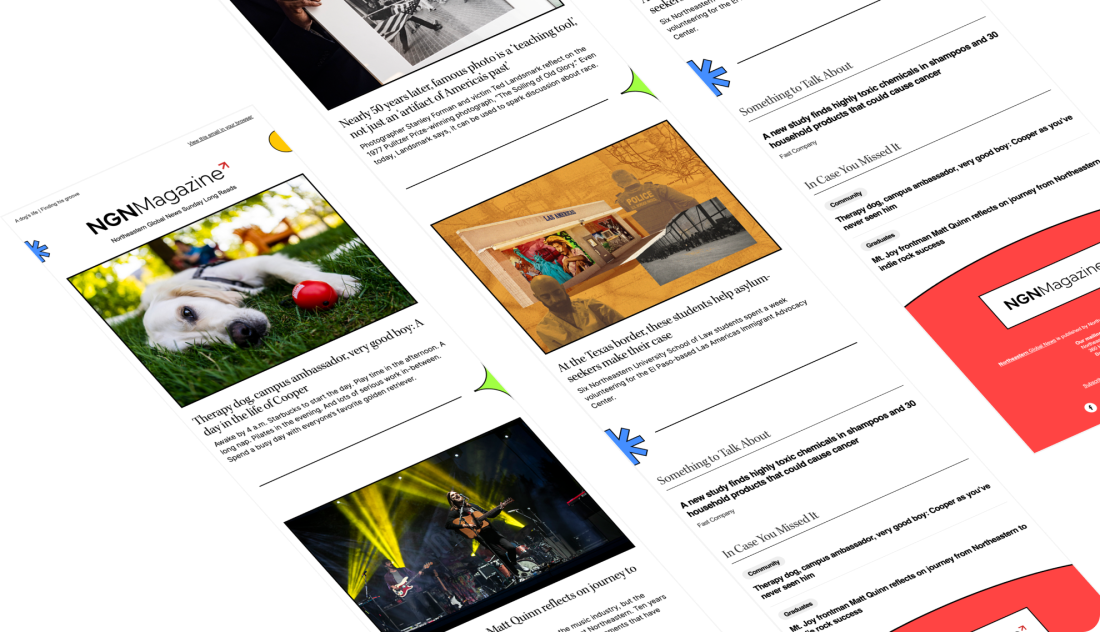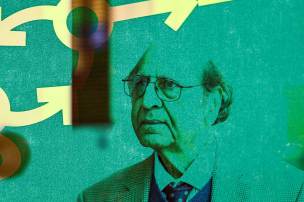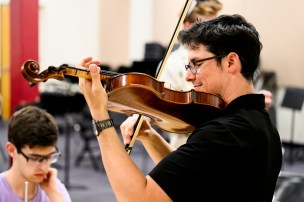Published on
Mary Ludden went from waitress to the C-suite of a Fortune 500 company. Today, she leads Northeastern’s global network of campuses
A decade after dropping out of college and starting a family, Ludden transformed her career and her life in three stages, each measured by the degrees — undergraduate, master’s and doctorate — she would earn along the way.
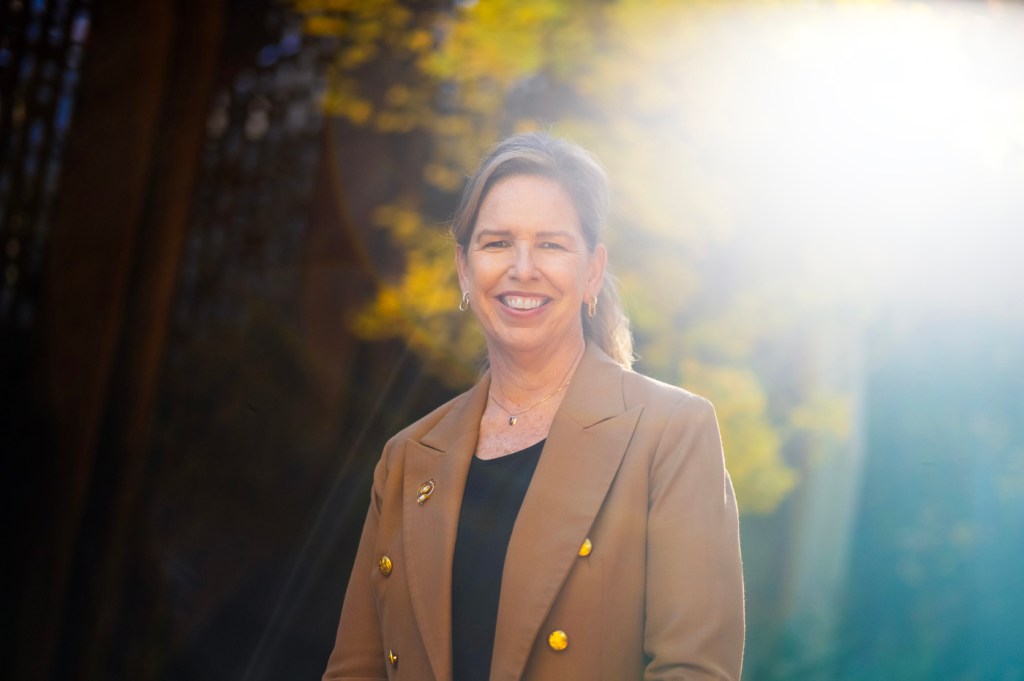
On this day Mary Ludden finds herself leading the global network of campuses that make up Northeastern University. It is the latest in a lifelong string of opportunities that she could not have imagined years ago as a young waitress, raising three children and struggling to pay the hospital bills.
“My career has been made on being a yes person,” says Ludden, Northeastern’s senior vice president for global network and strategic initiatives. “Because any project that came up when leaders would say, ‘Is there anybody willing to work on this project in addition to what you do?’ I would just be like, ‘Oh, that sounds interesting. Sure, I’ll be willing to help.’”
She grew up moving with five siblings to wherever their father’s career led them — Maryland, California, Hawaii, Massachusetts — until she wound up in Ohio, where she dropped out of college. When her first child arrived there was no plan except for showing pride in her work while making just enough to support her growing family.
There surely was no premonition that the blue-collar jobs of her 20s would lead so quickly to leadership positions in health care and then at Northeastern — where she would ascend in little time to help guide the university through the reopening of its campuses during the COVID-19 pandemic.
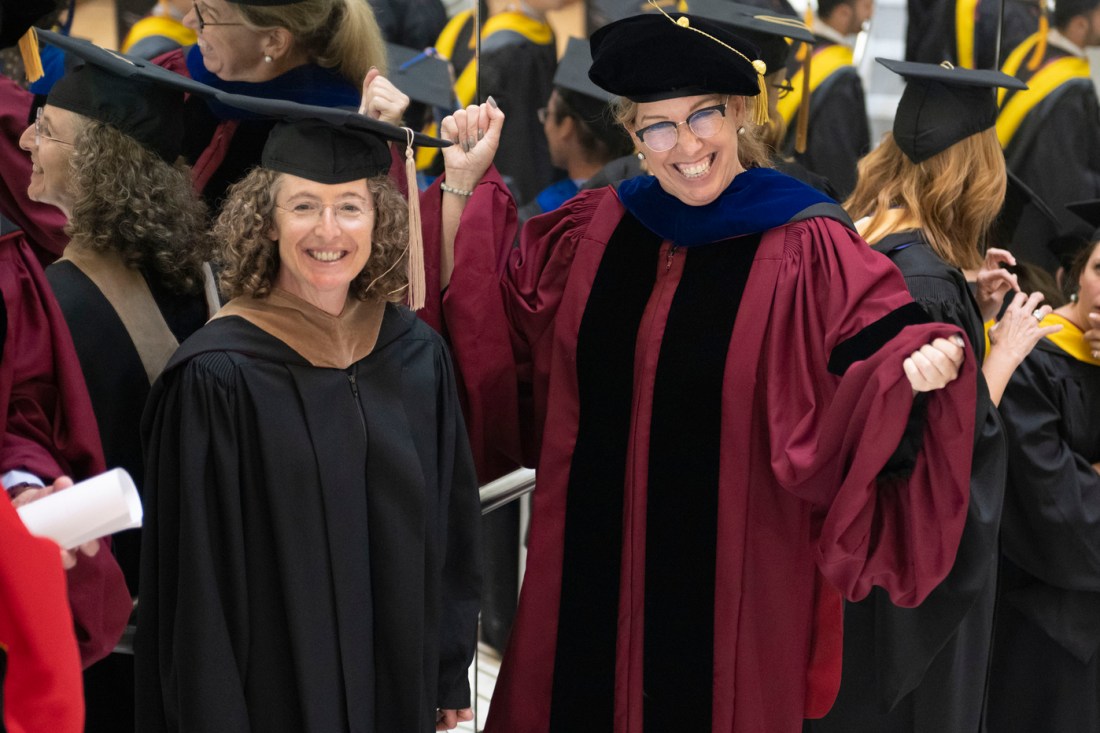
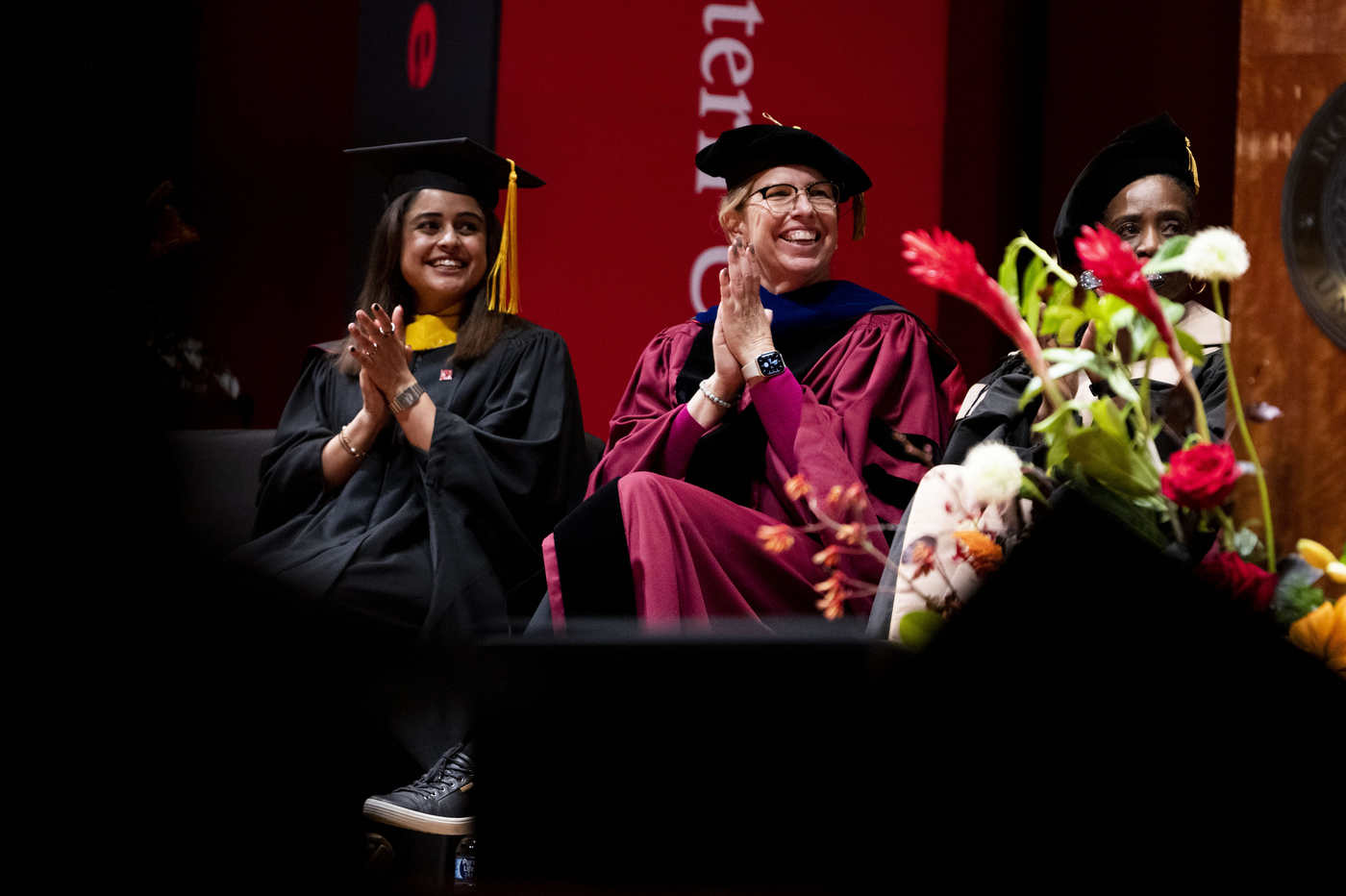
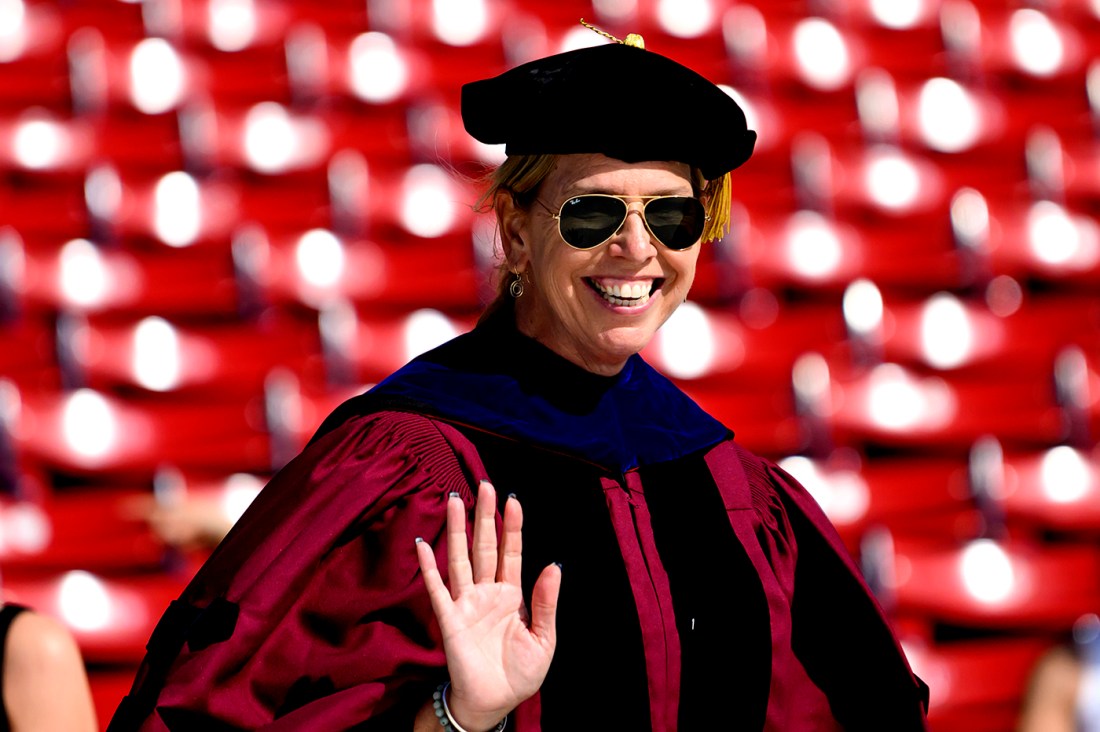
Six short years after arriving as an assistant professor with no job experience in higher education, Ludden has risen to embody the Northeastern story of experiential learning.
Her journey seems miraculous as she looks back on how it began. A decade after dropping out of college and starting a family, Ludden transformed her career and her life in three stages, each measured by the degrees — undergraduate, master’s and doctorate — she would earn along the way.
“I’ve just recently started telling the story,” Ludden says. “I think for women it’s a different narrative that you adopt for so many years, because you think you have to be a certain way or that people are looking for a certain type of person. I wasn’t comfortable sharing it for a long time because I still wonder what do people think when they hear I was a waitress that dropped out of college.”
An ultimatum
Ludden was beginning her junior year at Ohio University on a swimming scholarship as team captain when she approached her head coach with a dilemma. Everything was about to change. Painfully so.
“It was a Division 1 program and I had a really hard time balancing those responsibilities and schoolwork,” says Ludden, who is 6 feet tall. “I wasn’t the best student at all. I was just overwhelmed.”
Editor’s Picks

What do corporations need to ethically implement AI? Turns out, a philosopher

Business leaders should use human-centered approaches to AI adoption, Northeastern dean says

Expert advice: Coping strategies for navigating the 24-hour news cycle

Google’s brand ads are a “sham” but companies have to buy them anyway, new report finds

With the help of Northeastern, Tennessee Valley Authority experiments with a new forecast model to better predict extreme rainfalls
She had dabbled in studying journalism and athletic training while trying to find her way academically. A rewarding summer job at the university’s College of Osteopathic Medicine had left her questioning the rest of her life with graduation less than two years away.
“I started thinking about how I really needed to have skills,” she says. “I asked my coach for some flexibility so that I could work a couple of days and continue to build the resume. He said no, and then I was called into the coaching office with him and an assistant coach. They said, ‘This is not going to work. You’re going to have to give up your job.’
“In that moment I was struggling. I wasn’t doing well in classes. And then the thought of, I’m just going to be a swimmer … this thing that I loved so much had become an albatross.”
She went home for Christmas break and didn’t return.
“I rarely think about that moment but it was incredibly hard,” Ludden says. “I moved back to Massachusetts and my dad said, ‘Great to have you back — you’re going to pay rent for your bedroom and you’re going to get a job.’ It was real tough love immediately.”
Her father had worked for the IRS, peaking as its chief financial officer despite lacking the college degree that he’d been unable to afford. Which helped explain why he and Ludden’s mother, a schoolteacher, were adamant that their six children would graduate from college.
“I think I was always an insecure person,” she says. “I was tall, I felt like I didn’t fit in, everybody would always ask me if I played basketball. I always felt awkward and didn’t have — outside of the swimming pool — a ton of confidence.”
And yet from the coach’s ultimatum she learned a truth that she would apply throughout her professional career.
“There’s always a middle,” she says. “So if someone says, ‘I don’t think I can do this,’ I have learned how to say, ‘Tell me more about it. I’m not going to try to convince you. I just want to hear what you’re thinking.’ And then there’s much more of a conversation.”
The oldest student
What came next? She fell in love.
She was a waitress in her hometown of Concord, Massachusetts, at the historic Colonial Inn. He was the chef. She became pregnant. They married. They would have three children together.
“I had Christopher without health benefits — a [cesarean] section — and I think the bill at the time was $20,000,” Ludden says. “We paid it off, but that was crippling for years. But if you work in the restaurant industry, that’s just a common denominator. There’s no health benefits, there’s no retirement, and I learned after having my second son, Channing — there was something in me that said something has to change.”
She commuted to the University of Southern Maine and graduated in accounting with a minor in finance in 1996. At 30 she was a decade older than her classmates.
One year later she was hired by Anthem, a health insurance provider now known as Elevance Health. Ludden started as an entry-level Medicare auditor. Nineteen years later she would depart as vice president and chief operating officer.
That dramatic rise makes sense to Aliza Lakhani, regional chief executive officer and dean of Northeastern in Toronto.
“You could put Mary in a room with different types of people and she could find a way to relate to all of them,” Lakhani says. “I think that comes through her own lived experiences and the diversity of those experiences. So you could put her with students, you could put her with government people, you could put her with regulators. You could put her with CEOs or with academics or faculty. She’s quite exceptional at finding common ground.”
Everything that had happened was pushing me towards the dream. It was a big open door and I was just going to walk through it.
Mary Ludden, the senior vice president for Global Network and Strategic Initiatives at Northeastern
‘What about me?’
Here are three lessons (among many) that Ludden would pick up from the corporate world:
1. Say yes
Her big break in health care resulted from an opportunity for which she was unprepared.
She had enrolled ambitiously in a strategic leadership program. Her performance in those seminars inspired the company president to recommend Ludden to a manager who was creating a team to deal with changes in federal law.
“I had no idea what it meant to be in contract administration or what federal contracts were at the time,” Ludden says. But when the surprise offer came, “I said, ‘Yes, sure. Sounds good. Sounds different,’” Ludden recalls. “And that career move changed my life.”
Ludden would double-down by earning an MBA in 2010. Shortly thereafter, she began pursuing a Ph.D. in public policy analysis. Having been raised in a family devoted to higher education, and now gaining confidence from her flourishing career, she found herself taking night classes toward the advanced degree that might help unlock her ultimate dream of working at a university.
2. Listen
Having moved into management, Ludden was intent on using her leadership position to help people. Referring back to her college experience, it started with seeing the world from their points of view.
“The CEO of Anthem was talking to a group of us and he said, ‘When you make large-scale change or you need important projects to get done, the people around you are going to want you to be able to answer three questions,’” Ludden says. “And I was like, OK, I need to know these three questions, I’m ready with my notepad. And he said, ‘For any change, for any type of disruption to a person, they have three questions: “What about me? What about me? And what about me?”’
“What about me, what about me and what about me have become barometers of how I think about leading, how I think about interacting with people, how we think about doing things that are important,” Ludden says.
That sense of empathy defines Ludden, says Rob Farquharson, chief executive officer of Northeastern in London.
“How do you touch the people you work with? How do you interact with them?” Farquharson says. “Mary takes people at face value based on what they’ve done and what they are doing in the moment — and not where they’ve come from.”
The lesson in teamwork led Ludden to another bit of wisdom. “I am a big believer in not doing things that don’t matter,” she says.
These truths would be especially helpful during the COVID-19 pandemic.
3. See the bigger picture
“In October 2015 I had gone home to Hawaii for a swimming hall of fame induction — my coaches were being inducted,” Ludden says. “And I happened to run into an old swimming friend, Mark Takai, who had been elected to the U.S. Congress from Hawaii. He was talking about how this was his dream and what was hard about it, and he said something to me. He said, ‘I always just felt like the time was now and you’ve just got to go after your dream.’
“Mark ended up passing away from pancreatic cancer in July that following year; he had not been diagnosed when I saw him. And that had a profound impact on me. How could this happen to somebody who was so bright and engaging and dedicated to his career? I was in line at the Baltimore airport and the news came over that Mark had passed away and I just had that moment of clarity. If not now, when?”
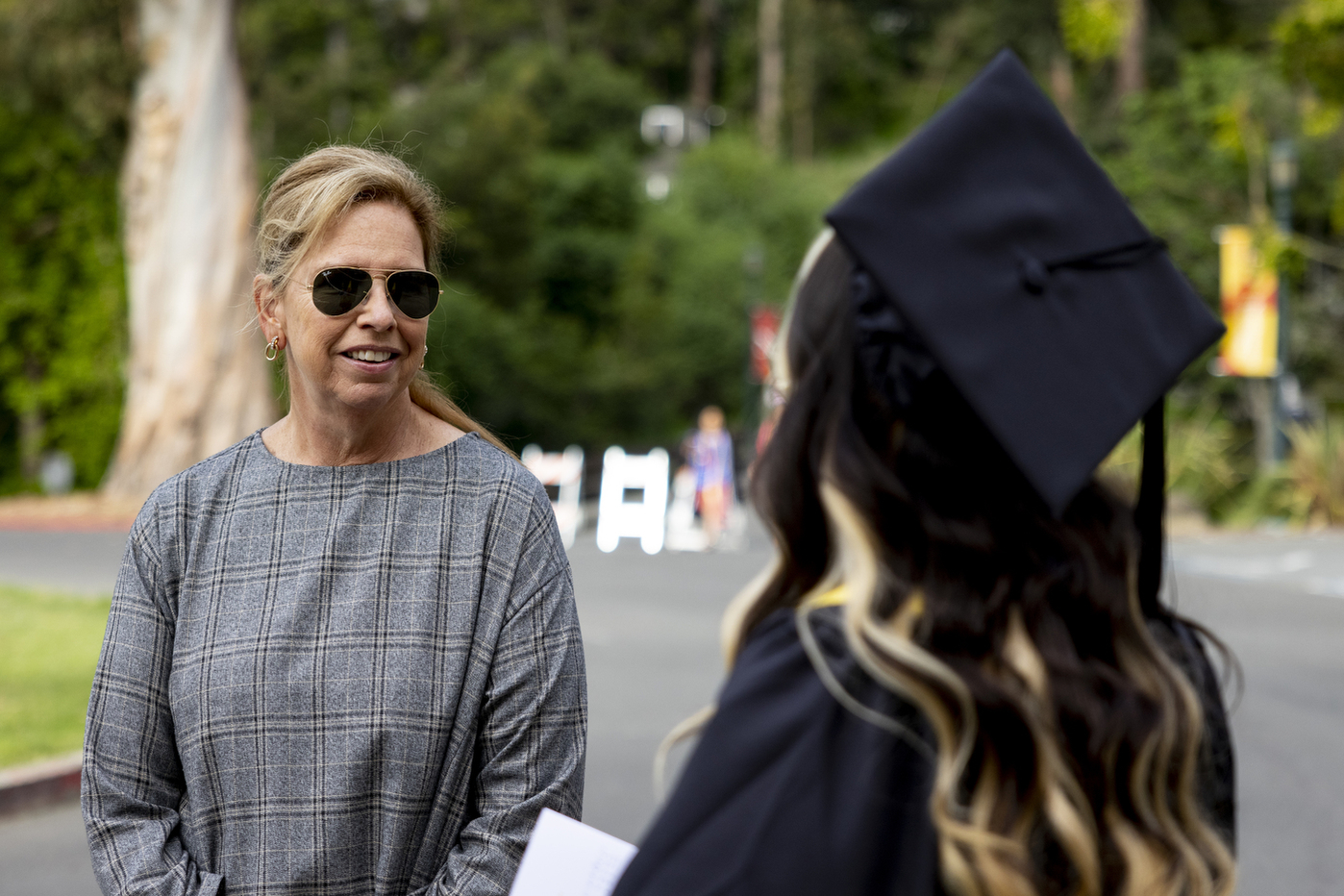
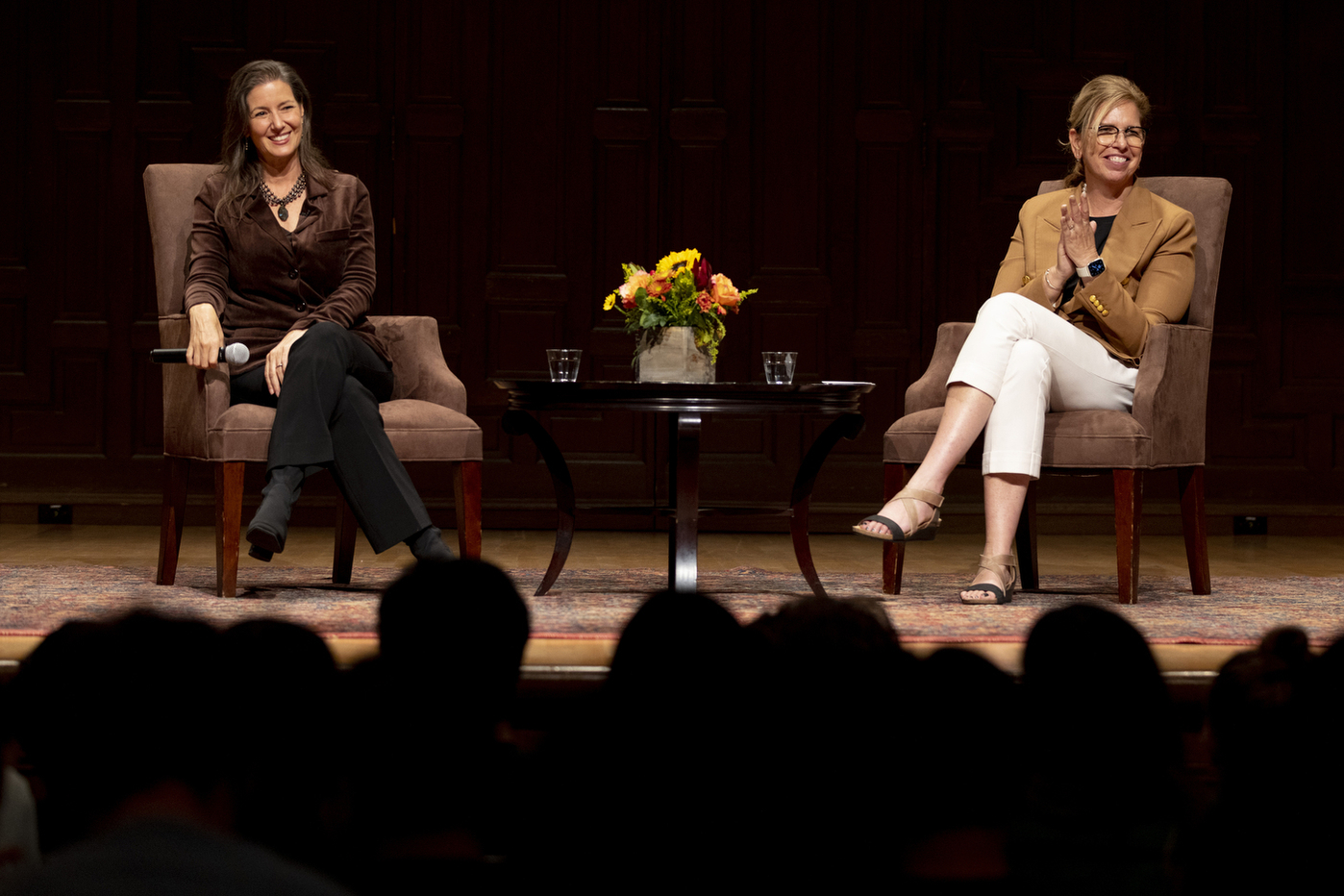
A half-year later Ludden received a call from a Northeastern recruiter. When the job offer came, she instantly said yes.
“I didn’t say, ‘I’d like to get back to you’ or ‘I’ve got to do this or that,’” Ludden recalls. “Everything that had happened was pushing me towards the dream. It was a big open door and I was just going to walk through it.”
Colleagues wondered if she was surrendering to a midlife crisis. She was a COO leaving to become an assistant professor in project management at the College of Professional Studies. But Andrew Conn, who was mentored at Anthem by Ludden, says she was always teaching.
“The biggest thing I learned from Mary is to be an authentic leader,” says Conn, president of federal government solutions at Elevance Health. “Earlier in my career, you try to be something you’re not because you think that’s what people need you to be. I know I’m not a slick sales guy. But I can communicate, I can be myself; I probably don’t respond well on the fly, but I process. Mary’s guidance was really, really significant. I think that’s been a game-changer for me.”
Responding to ‘a time of fear’
Ludden advanced with her by-now typical speed as she sought out additional responsibilities at Northeastern. Within two years she had been invited to move from CPS to become assistant vice chancellor of strategic planning and projects. She had been serving in that role alongside Chancellor Ken Henderson for nine months when Northeastern, like all major institutions throughout the U.S., was struck by the escalating COVID-19 pandemic. In March 2020 students vacated the campuses while attending classes online.
Joseph E. Aoun, president of Northeastern, committed the university to reopening the campus to students the following fall. At the heart of that plan was the need for an on-campus testing center that would enable students, faculty and staff to receive results quickly, preventing the spread of the virus.
“It was such a time of fear,” Ludden says of the pandemic, which has claimed more than 1.1 million lives in the U.S. “We had no idea what to do. We didn’t know how to do tests. How are you getting them to the lab and how are you going to track them? How are people going to register?”
Scores of questions were raised and resolved at all of Northeastern’s campuses — across the U.S., Canada and the U.K. — amid the life-changing stresses of the pandemic. When the Boston testing center at Cabot Physical Education Center opened in August 2020, Ludden was there every day to oversee operations. The center was processing 7,000 tests daily, bringing the university together in a time of isolation.
“In the early days, the testing center became the center of the universe,” she says. “It was where everybody saw each other even while having to socially distance.”
“There was a real recognition that our students wanted to come back,” says Ludden. “They wanted a residential experience — and their parents wanted them to have it. And so there was a deep commitment from the president to his team that we were going to make that happen. The president firmly believed early on that COVID was here to stay and that we had to learn as a university to navigate whatever challenges arose.”
Ludden took an apartment on Columbus Avenue in order to be on call at all hours. Tested two times per day, she remained free of COVID-19 while working at Cabot.
“I’ve had it now twice,” she says. “But I never got it in the testing center.”
‘The waitress is never far from me’
Walking through the Boston campus recently on her way to a leadership meeting, Ludden stops every minute or two to greet colleagues who have become her friends. These extensions of her commuting time are not so much an occupational hazard as they are, essentially, the reason she cares for her work.
The same dynamic emerges at all of the campuses, says Dave Thurman, dean and CEO of Northeastern in Seattle.
“She has the ability to think about the strategic intent of the whole global network and everything that’s going on at the individual campuses — while also connecting with me or another dean or whoever she knows, and remembering details about what’s happening on my campus or my personal life,” Thurman says. “And I don’t know how she keeps it all straight.”
After she had done her part to help the Northeastern campuses reopen during the pandemic, she was asked by Aoun to help bring those campuses even closer together.
“It’s something that allows our students to study and learn in context and have impact in multiple ways throughout their academic history here,” Ludden says. “So it’s truly unique. There’s no other university doing what we’re doing. We want students to stretch themselves and experience the system along with their program so that when they leave the university, they’re truly global citizens.
“But then, of course, everybody is a Husky for life. You go into your next phase in how you experience the university.”
She is speaking from the experience of someone who never saw her own future coming. With her eyes and heart open, she responded to each new step, making it up as she went along.
“The waitress is never far from me, ever, in almost everything I do,” Ludden says. “That lifestyle mentality where I worked for cash tips and that’s all I had to pay for groceries, and really focusing on the day to day and never having a balance of more than a couple hundred dollars in my checking account, I don’t think you ever lose that sense of instability and not being able to provide on a long-term basis. Because that’s not that many years ago, right? That was my life. It reminds me constantly that everybody doing any job, no matter what it is, deserves respect and acknowledgment.
“And now,” she says as she approaches the new EXP building, “I’m about to go meet with the president of Northeastern. If I stop and I think about that, it sounds unbelievable.”
Ian Thomsen is a Northeastern Global News reporter. Email him at i.thomsen@northeastern.edu. Follow him on X/Twitter @IanatNU.




